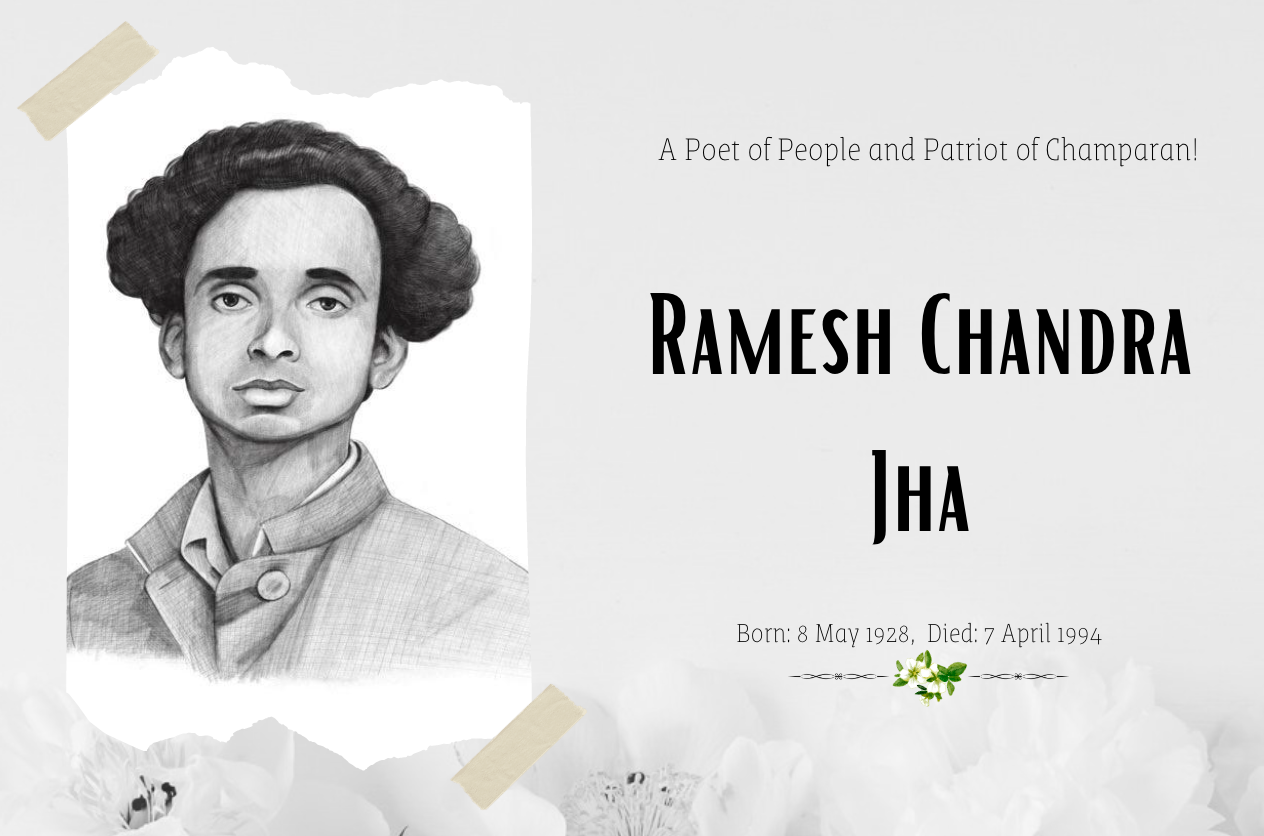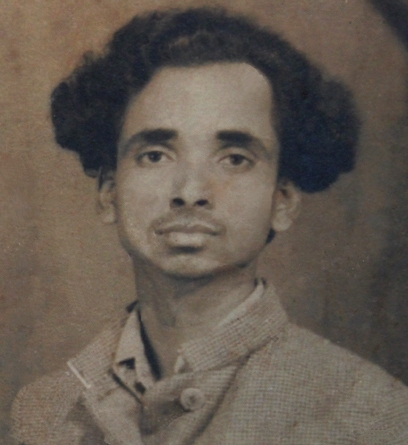Ramesh Chandra Jha is being remembered on his 95th Birth Anniversary at the national level under the 75th Anniversary of Indian Independence (Azadi Ka Amrit Mahotsav). These days this name has emerged prominently in the category of eminent poet-author and freedom fighters of Bihar.
On August 8, 1942, when Mahatma Gandhi declared the ‘Sampoorna Swaraj’, there was a new enthusiasm among the revolutionaries nationwide. Champaran was also a witness to this complete revolution. Everyone waged a war against British rule in their own way. Since Gandhi’s Champaran Satyagraha in 1917, the people of Champaran have given a new message of revolution to the whole country. Since then, Champaran has become the hangman’s noose for the British. The people of Champaran had shaken the foundation of British rule from time to time. In 1942, a young blood of Champaran, Ramesh Chandra Jha, actively participated in the ‘Quit India movement’.
Ramesh, a multifaceted personality who left a lasting impact on Indian literature and the independence movement, was born on May 8, 1928, in the middle-class Brahmin family of Phulwaria village in Sugauli, Champaran district (currently East Champaran), Bihar. His father was a well-known independence activist who had been arrested and imprisoned on multiple occasions, including the ‘Champaran Satyagraha’ in 1917.
Influenced by his father and the contemporary political climate, Ramesh became a rebel at a very young age. Many cases were filed against him in the police station in Sugauli, Champaran, the most famous of which was the ‘Thana Dacoity Case’.
During the August Revolution, due to British suppression, a shooting incident took place in Bettiah on August 24, 1942, which sparked a movement throughout Bihar. On August 26, 1942, young Congress workers hoisted the flag at the Sugauli post office and took control of it.
There was also looting and arson outside the post office, police station, and railway stations, and police papers were burned, leading to the arrest of most of the freedom fighters.
Ramesh was also implicated in the looting at the ‘Sugauli Thana’. At that time, he was a student at Hazarimal High School in Raxaul. There was a group of Hazarimal high school students which was led by Ramesh.
Ramesh and his group looted the police station and ran away. This incident attracted the revolutionaries because of the bravery of the 14-year-old patriot.
He was charged with multiple cases, leading to long-term fugitive status.
A court in the Muzaffarpur district had even pardoned him, claiming that this innocent-looking boy could not have committed such awful crimes as looting and snatching firearms. But, in reality, he was involved in both crimes. According to the ‘Ministry of Information Broadcasting’, “ Ramesh Jha went to jail many times during the Quit India Movement. When he was in High School, he was entrapped in several cases of robbery during the freedom struggle. He was thrown out of the school due to leading student protests. During his family’s active involvement in the freedom movement, Britishers set his house ablaze many times.”
In the monthly magazine “Naya Jeevan”, published in 1963 by Vikas Limited, Saharanpur (Uttar Pradesh) and edited by Kanhaiyalal Mishra ‘Prabhakar’, an article written by Rameshchandra Jha was published, which stated, “The Anwar Daroga of Sugauli was aware of the charges leveled against me, but he was primarily concerned about the pistol that had gone missing, so whenever he came to arrest me, he would speak respectfully, and I would occasionally remark, “I am not in the mood to be arrested today.”
This occurred during the time when a collective fine was imposed on the revolutionaries of Champaran. The government was brutally collecting the fine. Gokul Thakur, a freedom fighter, directed Rameshchandra Jha and Ramakant Jha (Nayaka Tola) to go to Sugauli and record whose belongings were being auctioned off by the government and how their worth was established. They were sent with the notion that because they were young, they would be protected from arrest, but the contrary happened, and both were arrested. In the history book “Bihar Through the Ages” Vol 1, Ritu Chaturvedi and R.S. Bakshi stated that “they were handcuffed and hauled to court from Motihari station the next morning after spending the night in custody under Section 38(5)(a) of the Indian Defence Act.”
After serving a one-year sentence, he was released on bail but had to go to Motihari on the appointed date two to three times a month.
India got independence not only through a few freedom fighters but also because of such forgotten heroes who instead went with mainstream politics, chose writing, and made notable contributions to the field of literature. Ramesh Chandra Jha, having developed a keen interest in Indian and world literature while serving his six-month sentence in jail.
He went on to write more than 70 books in almost all genres of Hindi literature, including poetry, novels, short stories, biographies, and essays. He has written many ‘Veer Ras’ poems, one of the most essential poems to motivate today’s youth.
“Dhaaron ko dene chala vichaar kinaaron ke,
Muthhi bhar dahak phool liye angaaron ke,
Main aag bhare path ka anamana musaafir hoon,
Nikala ukasaane bhujhte diye majaaron ke !”
” Akinchan deeya saadhana ka akela,
Janam se jala hai maran tak jalega…”
” Jo kiran ke aagman se toot jaaye besahaara
Bhor ka tara nahin hoon…!
Ban gaye humdard kaante chubh gaye jo
Zindagi kya maut se haara nahin hoon !”
He was recognised as one of the leading literary figures in the Hindi language and was invited to speak at several literary conferences and events, including the All-India National Poets Conference, where he represented Bihar.
His research published as ‘Champaran Ki Sahitya Sadhna’ and ‘Apne Aur Sapne: A Literary Journey Of Champaran’ in the 1960s traced the rich literary heritage of Champaran in Bihar and noted the upcoming young poets such as Dinesh Bhramar and Pandey Ashutosh. In most genres, he wrote more than 70 books including Priyamvada, Megh-Geet, Murlika, Swagtika (poetry collections), Rao-Hammir, Kaling Ka Lahu, Majar Ka Diya, Yah Desh Hai Veer Jawanon Ka (historical novels) are highly appreciated literary giants.
15 August 1972, on the 25th anniversary of Indian independence, Indira Gandhi awarded him with Tamra Patra for his participation in the Indian freedom struggle. He was also awarded the Dr. Uday Narayan Tiwari Award on 2 October 1993 at the National Bhojpuri Language Summit in Raniganj, West Bengal. Ramesh Chandra Jha’s Bhojpuri poem has been included in the textbook of Bhojpuri by the Bihar government.
Ramesh Chandra Jha’s contributions to Hindi literature and the Indian independence movement were significant. He passed away on April 7, 1994, but left dozens of beautiful sonnets, inspiring poems, and historical novels behind. His unpublished short biography on his life and time during Quit India Movement is also about to come.
Shashi Ranjan is pursuing English Journalism from Indian Institute of Mass Communication, New Delhi























